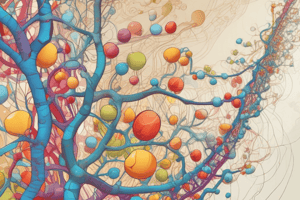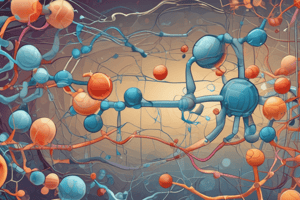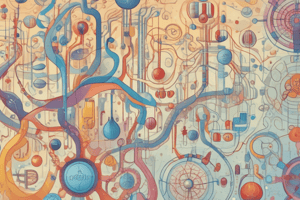Podcast
Questions and Answers
What is the net number of ATP generated from glucose to lactate?
What is the net number of ATP generated from glucose to lactate?
- 3
- 1
- 2 (correct)
- 4
Which enzyme cleaves one molecule of glucose into two C3 molecules?
Which enzyme cleaves one molecule of glucose into two C3 molecules?
- Lactate dehydrogenase
- Phosphofructokinase
- Fructose bisphosphate aldolase (correct)
- Hexokinase
During which process is NADH recycled back to NAD?
During which process is NADH recycled back to NAD?
- Citric acid cycle
- Electron transport chain
- Lactate fermentation (correct)
- Alcohol fermentation
How many molecules of NADH are produced up to pyruvate in glycolysis?
How many molecules of NADH are produced up to pyruvate in glycolysis?
What happens to NADH if oxygen is present?
What happens to NADH if oxygen is present?
What is the role of PEP in glycolysis?
What is the role of PEP in glycolysis?
In which tissues does the reduction of pyruvate to lactate primarily occur?
In which tissues does the reduction of pyruvate to lactate primarily occur?
During which stage of glycolysis is one ATP used?
During which stage of glycolysis is one ATP used?
Which glycolytic intermediate has the highest concentration in a red blood cell?
Which glycolytic intermediate has the highest concentration in a red blood cell?
What is the primary function of 2,3-bisphosphoglycerate in red blood cells?
What is the primary function of 2,3-bisphosphoglycerate in red blood cells?
Which of the following glycolytic intermediates has the lowest concentration in a red blood cell?
Which of the following glycolytic intermediates has the lowest concentration in a red blood cell?
Which compound directly follows Fructose-1,6-bisphosphate in the glycolytic pathway?
Which compound directly follows Fructose-1,6-bisphosphate in the glycolytic pathway?
What role does ATP play in the glycolysis process?
What role does ATP play in the glycolysis process?
Which pathway is primarily utilized by E.coli and mammalian cells to break down glucose?
Which pathway is primarily utilized by E.coli and mammalian cells to break down glucose?
What role does phosphoenol pyruvate (PEP) play in E.coli regarding glucose transport?
What role does phosphoenol pyruvate (PEP) play in E.coli regarding glucose transport?
How does glucose enter eukaryotic cells?
How does glucose enter eukaryotic cells?
At which stages of the glycolytic pathway is ATP consumed in mammalian cells?
At which stages of the glycolytic pathway is ATP consumed in mammalian cells?
What is a key function of glucose phosphorylation in E.coli?
What is a key function of glucose phosphorylation in E.coli?
Which enzyme is responsible for cleaving glucose into two C3 molecules in the EMP pathway?
Which enzyme is responsible for cleaving glucose into two C3 molecules in the EMP pathway?
Which pathway is mainly utilized by some bacteria, but not by E.coli or mammalian cells, for glucose metabolism?
Which pathway is mainly utilized by some bacteria, but not by E.coli or mammalian cells, for glucose metabolism?
What is the end product of glycolysis from one molecule of glucose?
What is the end product of glycolysis from one molecule of glucose?
Flashcards are hidden until you start studying
Study Notes
Glycolysis Overview
- Glycolysis is a pathway used to degrade glucose, varying among organisms with different enzymatic steps.
- E. coli and mammalian cells primarily utilize the Embden-Meyerhof-Parnas (EMP) pathway.
- Alternative pathways include Entner-Doudoroff and Phosphoketolase pathways, with E. coli employing the ED pathway for gluconate metabolism.
Glucose Transport into Cells
-
Prokaryotes (E. coli):
- Glucose is phosphorylated during transport via the phosphotransferase system (PTS).
- PEP (phosphoenol pyruvate) donates a high-energy phosphate, preventing glucose from exiting the cell.
-
Eukaryotes (Mammalian cells):
- Glucose is transported into cells and then phosphorylated by hexokinase using ATP to form glucose-6-phosphate.
EMP Glycolytic Pathway in Mammalian Cells
- Initial stages consume ATP, while later stages produce ATP.
- One glucose molecule (C6) is split into two C3 molecules by Fructose bisphosphate aldolase.
- The bottom half of the pathway generates a total of four ATP.
- Net ATP yield from glucose to lactate is 2.
- Produces 2 NADH, typically reduced in the electron transport chain to generate more ATP when oxygen is present.
- The reduction of pyruvate to lactate recycles NADH back to NAD, occurring primarily in muscle during exercise and some cancer cells.
EMP Glycolytic Pathway in E. coli
- Similar to mammalian cells, one ATP is used early in the pathway, and one PEP is utilized, with ATP being produced later.
- Results in a generation of three ATP from the bottom half of the pathway.
- Total net ATP yield is 2, similar to mammalian cells, with 2 NADH produced.
Glycolytic Intermediate Structures
- Key intermediates include:
- Glucose
- Glucose-6-phosphate
- Fructose-6-phosphate
- Fructose-1,6-bisphosphate
- Glyceraldehyde-3-phosphate
- 1,3-bisphosphoglycerate
- 2,3-bisphosphoglycerate
- 3-phosphoglycerate
- 2-phosphoglycerate
- Phosphoenolpyruvate
- Pyruvate
Energetics of Glycolysis in Red Blood Cells
- Concentration of key glycolytic intermediates (in mM):
- Glucose: 5.0
- Glucose-6-phosphate: 0.083
- Fructose-1,6-bisphosphate: 0.031
- Glyceraldehyde-3-phosphate: 0.019
- 1,3-bisphosphoglycerate: 0.001
- ATP: 1.85
- ADP: 0.14
- Pi: 1.0
- 2,3-bisphosphoglycerate is predominantly found in red blood cells, aiding in oxygen release from deoxyhemoglobin.
Studying That Suits You
Use AI to generate personalized quizzes and flashcards to suit your learning preferences.




